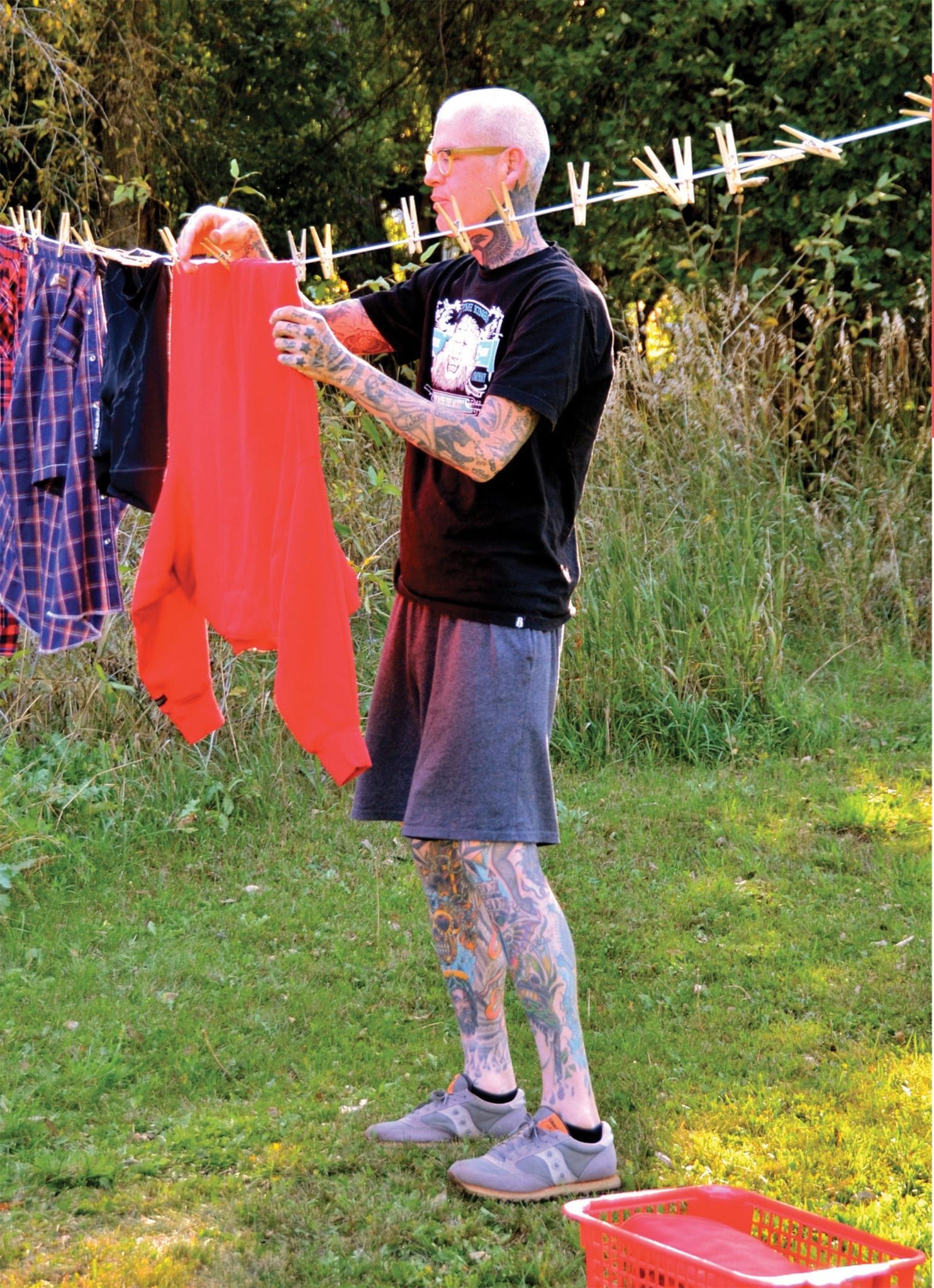
THE BOY CALLED MIKE LESAGE:
AN INTERVIEW WITH MIKE GIANT
By Derek Keenan
Published Issue 011, November 2014
Who the fuck…? This question arrived in my mind one fine summer evening in ‘02. 303Boards had teamed up with Revoluciones Arts and Culture Collective and brought the,“who’s who” of the street art world to Denver for an extraordinary group show. High above the gallery on a very well lit and highly risky billboard, I read the word “GIANT” in big silver bubble letters. I knew right then that this guy lives up to the name.
Fast forward a dozen years and I’m overwhelmed with honor to be sitting across the coffee table from the man himself.
Finally, I get to ask Mike some questions.
You recently left California for Boulder. Why the move here?
I’ve lived in cities with millions of people and I’m tired of that. I’ve traveled a lot in the last fifteen to twenty years building my career and now I’m really happy staying right here in Boulder. I like seeing the seasons change— like right now looking out the window seeing the leaves falling— I haven’t seen that in years. I’ve been living a very unnatural urban existence the last half of my life. Just the thrill of being able to take a big breath of air and it being that crisp, clean Colorado air— I couldn’t do that in Los Angeles. It was so frustrating. I’m a cyclist. I depend on my lung power to get me around, and if the fuel that my lungs are using is fucking poison, that’s rough.
What’s a typical day like for you now that you live in Colorado?
It’s more week-to-week. Once a week, I might give a tattoo for a few hours. Most everyday I’m just at the drawing table working away. Somedays I just take off on my bike and ride all day. I certainly spend a lot of days with my lady and her dog— that’s my favorite thing to do actually. I’ll do graffiti maybe once a month if somebody calls me, but it’s not something I’m very motivated to do myself.
You’re still a partner in the REBEL8 streetwear brand right?
Yes. In 2003, while living in San Francisco, I started a streetwear brand called REBEL8 with my business partner, Joshy. We started out printing t-shirts and it evolved from there. I did the drawings and he did all the design, production, shipping, everything else. I’ve been able to work on the drawings for REBEL8 from wherever I am in the world, and that is primarily my job today.
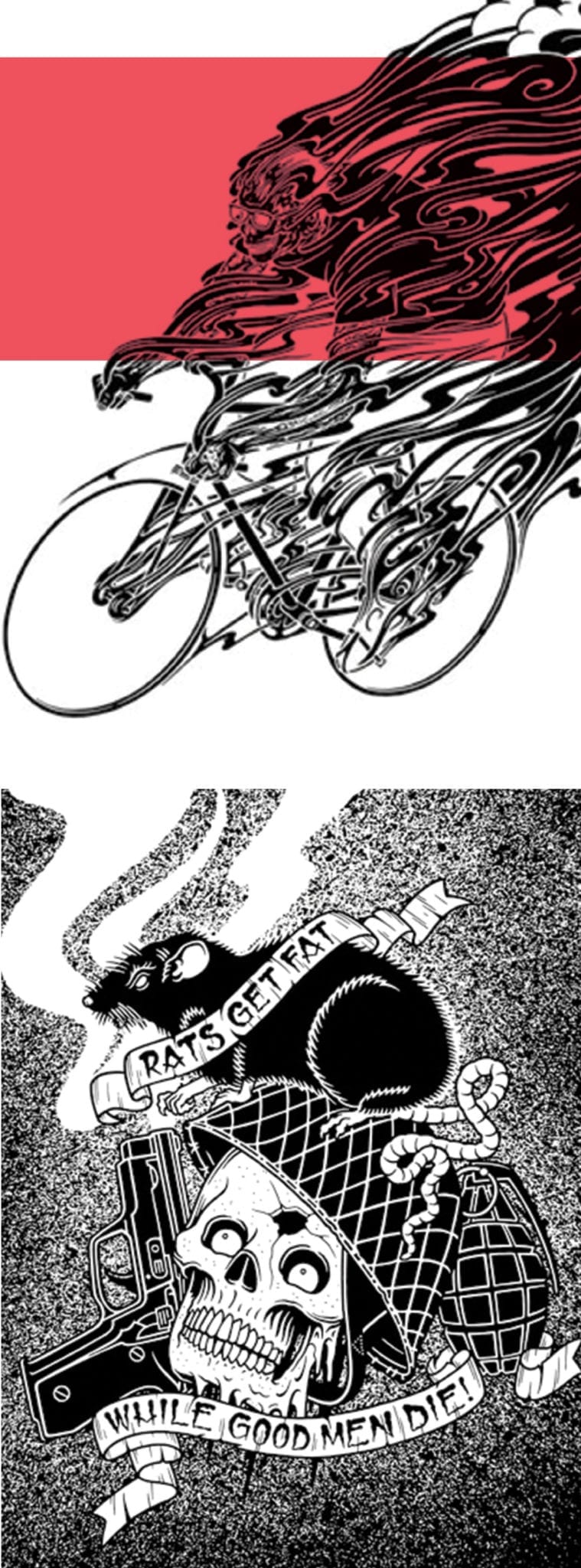
When I think of Mike Giant, I think San Francisco. How long did you live there?
I got to San Francisco October 1 of ‘93 to work for Think Skateboards. I had hooked up an apartment with one of the sales guys there so I had a place to live and a job, and that was really what lead me out there. I left in 2003 and ended up in kind of a round about way back in Albuquerque, where I grew up. I was there until 2008 and then went back to San Francisco until 2013. From there, L.A. for a year and then here in Boulder.
Do you consider San Francisco home?
The San Francisco that I lived in is pretty much gone so it’s hard for me to call it home. I feel like the corporate internet business took san Francisco over and pushed most of us out. Albuquerque, in fact feels way more like home because it hasn’t changed much, it’s pretty timeless.
I wish the Mission district had the same vitality it had in the mid ‘90s. Back then, it was us struggling financially but loving SF, and being around lots and lots of other artists who were super creative and driven. It was a lot more bohemian and admittedly dirty and crime ridden and beat, but there was so much heart there. It wasn’t ever a place that you went to, until recently, to pursue a career. Now it’s a place to cash in, it’s the new Manhattan. It just gets whitewashed.
There were a lot of people in SF that would have much rather stayed there, like myself, and just died there. At the same time, the city itself could have fought to maintain the integrity of the neighborhoods, but they didn’t. The government officials got hooked up with the corporations just like they do everywhere, and they get their little side deals and then they sell it out and they displace the people who already live there. It got too expensive and the majority of those folks that had to leave were black and Hispanic. so that loss just took so much of the heart out of the city— that mix, that diversity.
Did you feel like L.A. was going through similar changes when you lived there?
I’ve found myself at the front wave of gentrification many times unfortunately now that I look back. L.A, downtown L.A. in particular, is certainly going through that. Just within the year that I lived there, numerous high-end fashion corporate business opened right on Broadway which was still kind of crackhead ridden and sketchy. They are trying to rebuild the theaters and stuff down there so it’s getting cool, kind of. It’s losing that heart that I liked and that danger, but not everyone likes that I realize. I miss New York when it was sketchy.
So Brooklyn, same thing?
I was at the front wave of that as well. I lived there the summer of 2000 on grand near Havemeyer in Williamsburg. There wasn’t another white dude living on the block that I knew of at the time. It was all puerto Rican families. I lived upstairs from a Puerto Rican After hours Club that didn’t even start until 4 a.m. That shit was crazy. Just a few years later in ’03, I had my first solo show on the same block, and there was a little gallery there and other galleries were starting to open up. Just a year after that, there were glass front fashion houses, really nice restaurants and bars all over that neighborhood.
How is it that you end up at the early phase of change in all these neighborhoods?
I think because I’m an artist and I do have some balls and some notoriety. I tend to find rather hip people when I travel. I kind of magnetize them to me. so they do take me to the hot shit spots and it’s usually off the beaten path a little before the curve of trends and things. Again, it’s usually by the people who are creative and don’t have a lot of money to go and buy a fresh loft. They’ve got to go rent a warehouse that’s just a concrete box and turn it into a big architectural art project that they live in.
So do you think artists are the first indicator of change in neighborhoods?
Usually artists end up in low income areas and then they make it feel a little safer. Then more people come and the property values rise, and then eventually the artists price themselves out of the neighborhoods because they made it mellow. so then the artists are constantly searching for the next spot. I don’t think we really want to be uprooted and pushed around, but if we are going to have an economic system based on greed, the way we do those things are inevitable— that sort of push and pull that forces that movement. But I believe we would find much more contentment in staying put if we could.
What are you thoughts on social media and the role it plays in the lives of artists?
We are starting to tribe up in a way based on our interests. And social media allows us this incredible access to find people of like minded interest, and the tribes become worldwide. It’s made it amazingly easier. An artist can basically just have Instagram and an email now and be able to post a painting, sell it to someone on there and just keep on doing that. Art used to just be something you had to buy in a gallery, usually at a double markup so the gallery makes some money. Now it’s wide open. I’ve done that for years and years in fact.
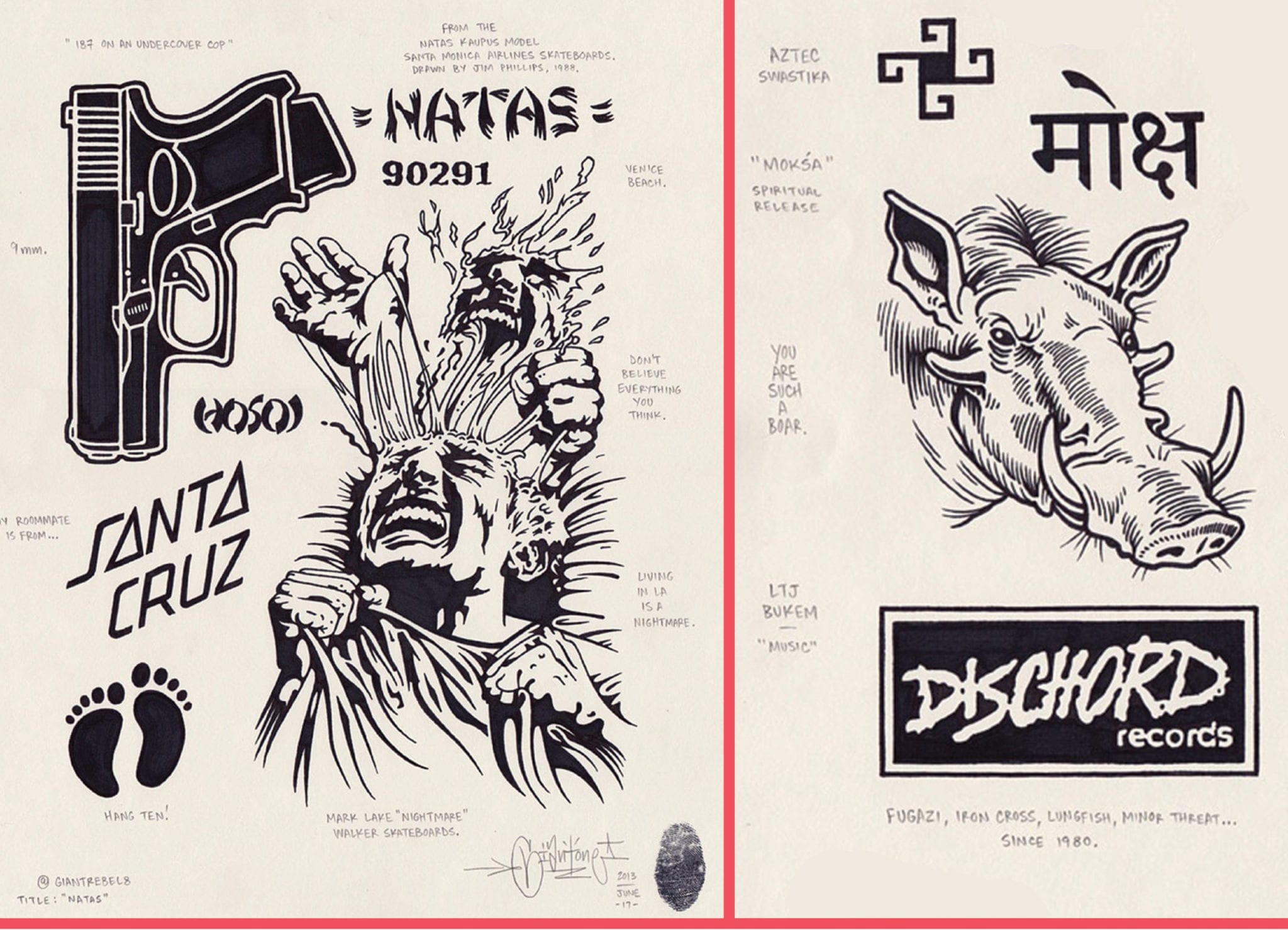
So what role do galleries serve today then?
It all depends. I can do an online sale of work and I will make just as much money as if I do a show in a gallery, if not more. The only disadvantage to the online offering is that there isn’t ever a physical show where people can go and observe the group of drawings in person. So in that way, a gallery is the only way to really show the work to the general public. I still feel there is value in that.
As to whether you can sell to just the locals, that’s usually pretty impossible. When I show at galleries in San Francisco, I will actually sell the majority of my work to the locals. But when I sell shows out, it’s generally because the gallerist put everything online and can take online orders from anywhere in the world, that’s the bottom line. So in a way, you could just put everything online yourself and skip all the bullshit.
To survive as an artist you need as many eyes on your work as possible because that’s what’s going to sell it. You never know when there is some random person in Poland who goes apeshit over your fucking stuff and they might become your best collector. It could be somebody that finds you on Instagram. That’s just the nature of things now.
Aren’t the people who can afford to buy art and live in SF also the same people who gentrified it?
That’s the fine art fucking pickle. You end up having to sell art to the people with disposable incomes. Art is a frivolous thing, a piece of paper worth $3,000. Are you fucking kidding me?
The people who can afford art are not the people making it and that’s alway been the weird mix for me. I’ve seen my work sell at gallery shows for example in Paris to people I don’t really like, and I don’t have any say in who buys the work if it’s going through a gallery. And as your work becomes more valuable, those kinds of people end up buying it.
That’s why I like the t-shirt business because it’s not usually the real estate crushers and the power movers that are wearing REBEL8. It’s much more accessible. It’s a standard item that people can reuse and it’s not selling some bourgeois shit. And granted, you can buy a blank t-shirt for a dollar and we are asking $32 for our nicer shirts with some sort of fucking graphic I drew on it. That’s a big difference. So I can see where even at the level of streetwear it is frivolous.
I do find a kindred spirit in the teenagers and twenty somethings that are into streetwear and skateboarding and cycling and graffiti writing. I still feel like I’m part of that tribe, and so I don’t feel too bad about involving myself in streetwear as a compromise to my involvement in fine art and even corporate freelance. But I’ve still gotta be careful with what I do.
Mike Giant sounds like an alter ego, like it’s your superhero name.
That’s the great thing about graffiti, you really do take on a moniker or a code name. I remember times I would be sitting in the courtyard at the college I went to and I had just tagged the shit out of that whole area the night before. I’m sitting next to a bunch of people who are really angry about all the graffiti and they are talking all kinds of shit saying, “Man, if I ever caught that motherfucker I’d beat him fucking senseless.” That to me was a really awesome experience in just being able to observe abstractly your influence on the world. It all just kind of evolved from there. It’s not really you, it’s just how people perceive things. I don’t really feel like Mike Giant is me (laughs). It’s this tool I use to survive in the culture. Mike Giant is this weird abstract thing that has notoriety with it and all kinds of things companies can use.
For the last, say, twenty years, I really focused on Mike Giant and it was to the detriment of my personal relationships and my health, but it was great for my career. And now I’m reaping the rewards of having worked so hard and so egotistically. Now I’m trying to take care of Mike LeSage a little bit more and keep the whole REBEL8 and Mike Giant as an abstract that I kind of watch happen.
I feel as Mike Giant, I had to seize opportunities wherever they arose in the world, and for years I was kind of in party mode going from one adventure to the next. I was never really settled anywhere. Now I don’t really need to be in a big city competing with my peers. The career is handled, now it’s personal time. I have a lot more alone time. Sometimes when I lived in big cities I would bounce from friend to friend every night. I had a lot of friends that I would see regularly in a continuous rotation, but I wasn’t getting very close because we were just rolling from bar to bar drinking, riding bikes around or tagging. I worked and played hard up until I was about forty, and I got kind of sick and just crashed. Now that I’m forty-three, I’ve had a few years to reconfigure my life direction and thus far it’s been good.
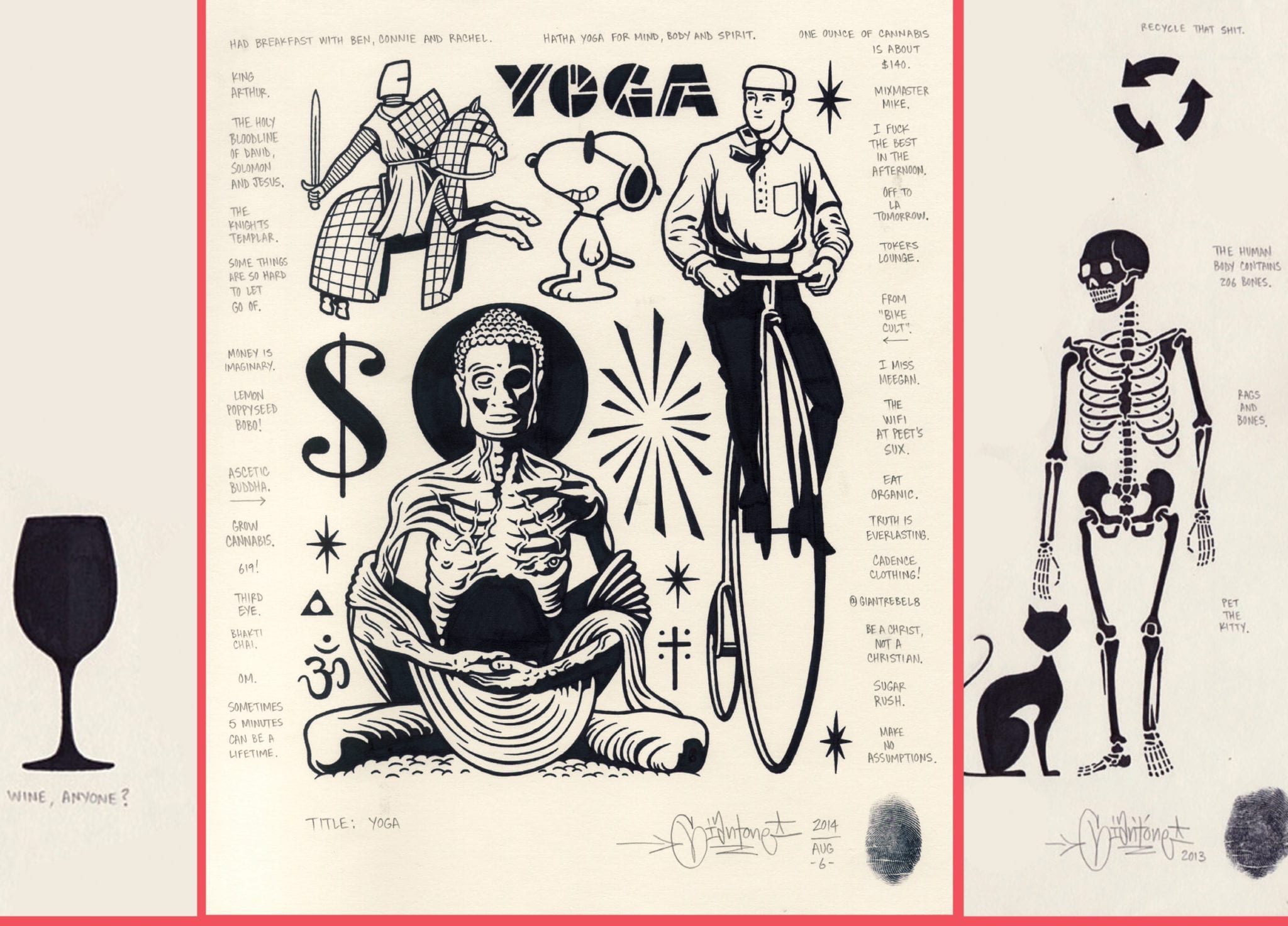
In your day, you’ve done your fair share of mind expanding drugs and now you’re very into meditation. Is there any similarity?
I feel like meditation and things like LSD and mushrooms can take you to a place within yourself, a spiritual side or whatever you want to call that, and it presents you with a door. It allows you to open that door and to walk into another realm, another way of seeing everything around you and everything you experience day to day is different. With LSD or mushrooms, you are allowed to go into that room through that door, but you don’t have any control over what happens in there or how long you are in there, or even how long it feels like you are in there.
With meditation, you’re able to walk up to the door calmly, turn the knob on the door calmly, open the door and walk in at your leisure, take your time there, have a good experience, see what it has to teach you without thinking about it, and then when you are ready, you come back. But I think it was the LSD and mushroom experiences that helped get me into that zone to know that was even possible. I saw that I was taking the world for granted.
Trees around me all of the sudden on LSD became these microcosms of expressive life, and I could see the way the branches grew on the trees was just like the way veins in my body grow, and that was just like the way rivers flow. You see that you are connected to everything. There are all these rhythms and vibrations we are all part of it. We think of ourselves as separate from nature, but we are nature. We are breathing the same air as the trees and the same air as people on the other side of the planet. It’s all one air, this thin layer of atmosphere.
Do you have a regular meditation practice?
I try to practice mindfulness through the whole day which is simply listening to my thoughts more than being caught up in them. Otherwise, I do a regular sitting meditation practice. I’ll sit on my cushions for forty minutes in silence. Sometimes I put music on and I set an alarm on my phone. All I’m doing there is trying to just exist without getting caught up in thoughts at all.
If I can, I’ll try to even let go of my concentration on my breath so that I’m not thinking about anything at all. I find a lot of inspiration from that space. Through meditation, I feel like I’ve experienced deeper and deeper levels of consciousness and I know that even deeper levels are possible and that’s really fascinating.
It’s the opposite to the path of staying up on the latest technologies, the new social media, the new goddamn iPhone, the whatever the fuck. The opposite of that rat race is the descent into egolessness that is brought on through meditation practice as well as mindful living in general. In my personal experience, where my art is coming from is right in the middle because I’m still on Instagram, I’m still using the internet to interact with the world and pushing Mike Giant as this abstract entity. It’s a full spectrum. At the mid-ground, which is my biology, the boy called Mike LeSage, there is some ego. At the other end of the spectrum of fucking madness and worldliness is Mike Giant, who’s fucking succeeding or whatever on that level. But to me that’s just another extreme. I’m not really after that personally. I’m much more after the middle of being.
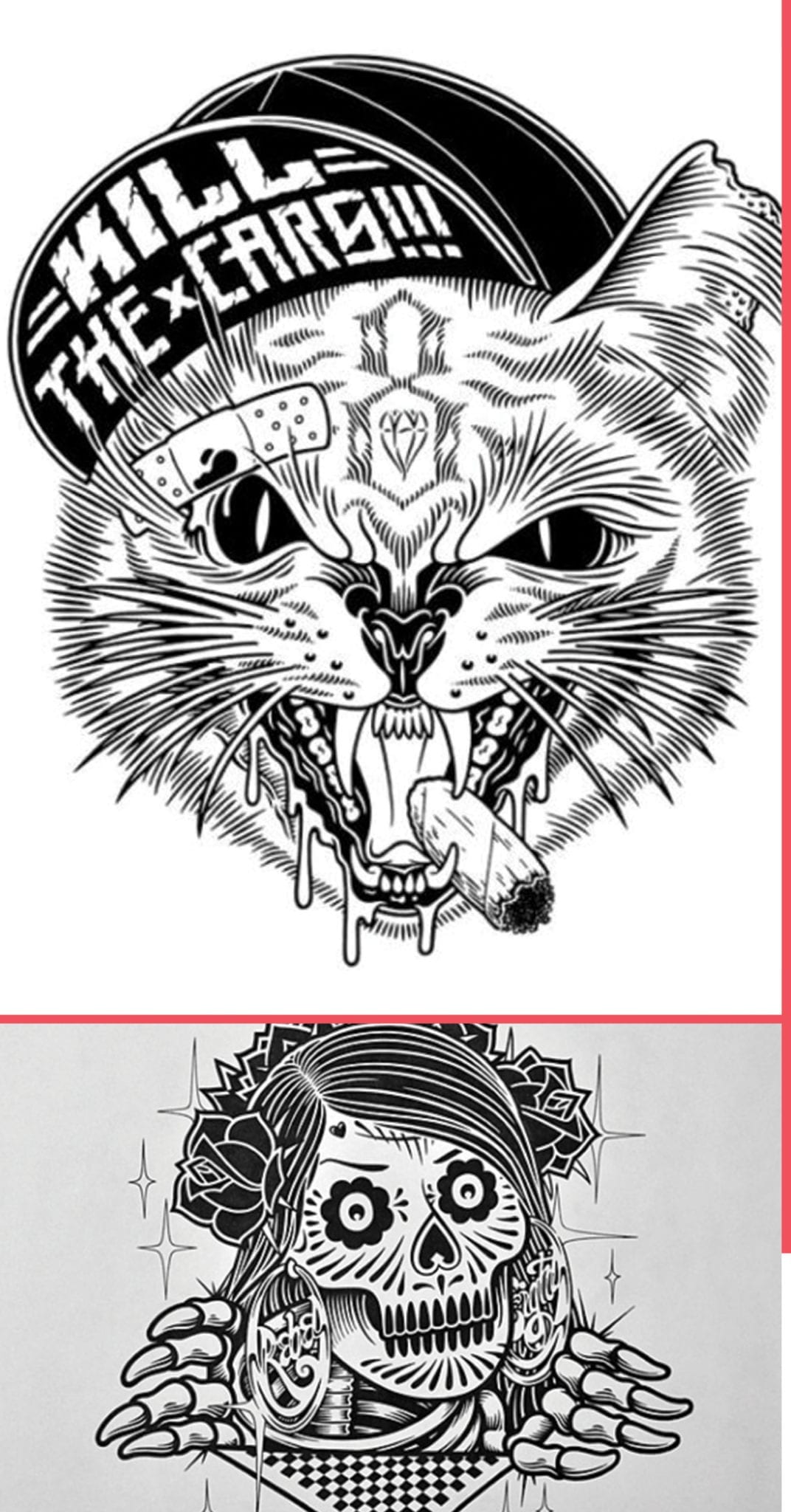
How has traveling informed your views?
A lot about how I understand things is about trying to remove my own programing. I didn’t really learn what it means to be an American until I lived in Europe at different times. I started to see that my culture is a creative enterprise, it’s not real per say. I feel like I was programmed as a kid about what America is about and what I should be about.
I had a girlfriend who did Peace Corps in El Salvador and I used to go visit her. You kind of don’t know what it is to live in a first world nation until you go to a third world nation. You realize the vast majority of people live in the third world. We are in the upper crust of the upper crust as far as means and access to medicines and foods and what ever the fuck we want. It’s America baby. It’s a crazy experiment.
You’re also a firm believer in DIY.
DIY: Do it yourself, show and prove, nobody is going to do it for you. If you’re going to work in the underground, you’ve got to hustle. If you want to play above ground and put on the suit and tie or the uniform and go do your sheeply duty for your country, fucking enjoy yourself. Go nuts. That’s pretty easy. You get your paycheck and your prescription drugs to keep you happy, and you get your nice car to sit your fat ass in. It’s great, it’s all good, fucking have at it, just don’t run me over, that’s all. It can be a hard travel to go against the stream. I can find truth in a punk ethic system as much as I can find truths in a Buddhist ethic system.
To me, what DIY is about is not participating in a system that looks down on you simply because you don’t want to put on the suit tie and play the roll. Starting your own shit and being supported by the people who believe in you, that’s dope as fuck. It’s a hard, scary life, but it’s rewarding.
Catch Mike at the REBEL8 Sunday Social every last Sunday of the month at Madelife in Boulder. For more info about REBEL8 and Mike’s art check out www.mikegiant.com
